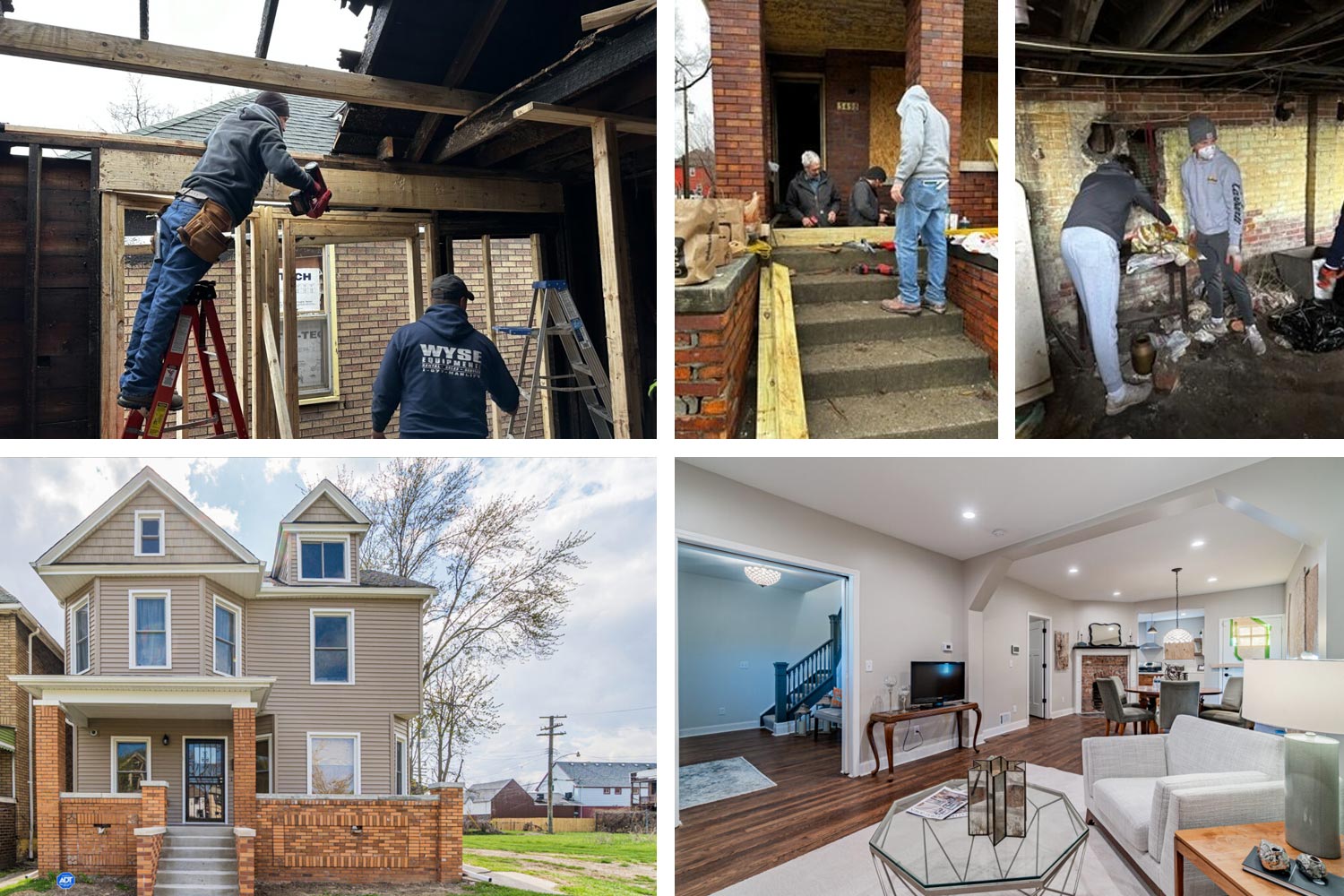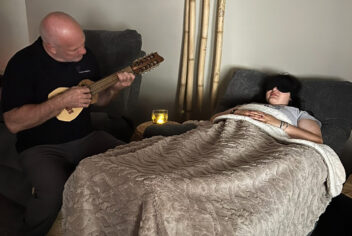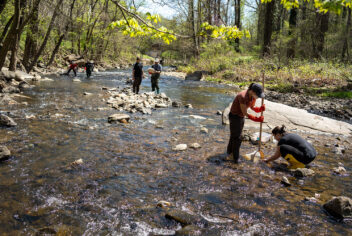Editor’s Note: Due to the sensitive nature of their mission work, the founders have requested their last names not be included.
Meet Haven Homes of Detroit
Haven Homes of Detroit is a nonprofit with a mission to provide safe transitional living spaces for those working to rebuild their lives and thrive after surviving human trafficking and exploitation.
Founded in March of 2021 by the husband-and-wife team of Aaron and Kristen, the organization purchases dilapidated and abandoned homes in the Detroit area, and then works with volunteers and the local community to restore them — giving the people they serve a place of safety, stability, and community as they begin their healing journey.
Haven Homes of Detroit is the 27,000th nonprofit to get their insurance from Nonprofits Insurance Alliance (NIA).
How They Serve
The People
When a survivor leaves a human trafficking situation, they often find themselves with no money, ruined credit, little education, and unstable housing, often while trying to recover from trauma, addiction, and mental health issues.
When they can find transitional housing, it’s rarely for more than a few days or weeks at a time — nowhere near enough time to get their lives put back together.
On their own (often for the first time) and without any community, stability, or resources, too many survivors find themselves pulled back into the abuse and exploitation they tried so hard to leave behind.
Haven Homes of Detroit tries a different approach, providing survivors a long-term stable home, providing them with their own living space, a sense of community, and access to resources that can help.
“Our goal is to remove the barriers that the women who are survivors face,” Aaron said. “This allows them the time and space to heal from the trauma they’ve experienced.”
Aaron explained that, while other programs will often attempt to crowd many people into a single bedroom, Haven Homes of Detroit provides each client with their own room and their own space, which is crucially important to their recovery.
“It’s semi-independent living,” he said. “It’s being able to put the pieces back together.”
Once they are settled in, the residents can focus on their recovery, without having to worry about rent, food expenses, and other stress factors that can impede their journey.
“Our program is 18-24 months, completely rent-free,” Aaron explained. “We provide life skills training, vocational assessments, financial literacy, and more.”
“Yoga, meditation, health and wellness, cooking courses — it’s all leading to education so that independence and self-sufficiency is attainable.”
While recovering from trauma is a major source of difficulty, placing the survivors with other people experiencing similar journeys can create a community of healing, Kristen explained.
“The community they create, that’s what survivors say they need and help hold each other accountable,” she said. “By bringing them together, our goal is for them to be as safe as possible.”
Once the survivors have completed their stay with Haven Homes of Detroit, the goal is for them to be in a place where they are able to be safe on their own, where they’re on a career or education pathway, and have a brighter future to look forward to.
“Our goal is not to cut off services after they leave,” Aaron said. “We want to be a support to them for as long as they need us.”
The Houses
Currently, Haven Homes of Detroit operates one house in the Detroit area, with a second under renovation and scheduled to be completed in early 2025.
With the abundance of homes that have been abandoned or otherwise left in disrepair throughout the Detroit area, beginning in 2021, the organization was able to purchase its first home for $40,000, and the second one for $50,000.
Restoration of the first house took place over the course of the next year, with a volunteer workforce and with help of the community, donating time, money, and supplies.
With the success of the first house, the second house nearing completion, and momentum building for their organization, Aaron and Kristen said that their dream scenario would be to open a new house every other year, in small pockets all around the Detroit area to serve a wider array of people.
“We definitely see the need in Detroit for housing,” Kristen said. “We know that the supply is there, it’s how to we know we have the infrastructure to help and support women well.”
The Journey So Far
Haven Homes of Detroit traces its origins back to 2015, when Aaron and Kristen joined up with a running club that worked to raise funds to fight human trafficking.
Through that organization, the couple became acquainted with many people whose lives had been affected by human trafficking and exploitation and were struck by the uphill struggles that came with trying to escape and start over.
One story that stood out, Aaron remembered, was a woman who they had worked with. She was struggling to recover from being trafficked and exploited, all while being housed in a motel on a week-to-week basis.
Without resources, he said, the constant worry of whether she’d have a place to live or not eventually drove her out of sobriety and back into an abusive situation, which ultimately ended her life.
“That was kind of an ‘aha’ moment for us,” Aaron said.
From there, the seed was planted for the couple that something needed to change in order to give survivors a real chance to take back their lives and be successful.
By the time the COVID-19 pandemic struck in 2020, Aaron and Kristen had begun assembling their friends and family members into a board of directors. By October, Haven Homes of Detroit had attained 501(c)(3) status.
“Since then, in three years and nine months, we have a very diverse board, with key positions set up to continue helping us grow and get our infrastructure in place,” Aaron said.
The first survivor “graduated” from a Haven Homes residence on June 7, 2023. Since then, Aaron said, having proof of their concept working has drastically increased volunteer and donor interest.
“With proof of concept and outcomes, we’ve had a lot more volunteers and donors,” he said. “60 percent of our funding comes from personal donations.”
The duo credits the success of Haven Homes of Detroit to their strong team — particularly applauding their belief in the mission and their willingness to reach out and talk to their connections about the organization.
Just recently, the organization celebrated receiving a two-year accreditation through the Safe House Project, which Aaron explained had involved a rigorous six-month approval process to ensure that Haven Homes of Detroit employed best practices.
Because there is no national or state oversight for adult transitional homes, he said, it was important to receive this designation.
“We want to operate with industry-best standards,” he said. “As far as we know, we are the only one that’s accredited in the Detroit area.”
The Insurance Connection
Haven Homes of Detroit had originally been insured by the same insurer that provided coverage for Aaron’s construction business, but issues with communications led them to seek a new insurance partner.
“It has not been easy,” Aaron said. “The biggest barrier for us being insured has been wanting to be in Detroit — you definitely have escalated costs for insuring property and vehicles.”
He said that, in the short time Haven Homes of Detroit has been insured by NIA, he’s been impressed by the clear communications that removed the guesswork from the organization’s coverage.
“Working with NIA, it was very clear what was being provided,” Aaron said.
Haven Homes of Detroit was connected with NIA through Ann Arbor Insurance Centre (AAIC), an insurance brokerage in the Michigan area, and a longtime NIA partner.
“AAIC has been working with NIA since 2013 due to our deep involvement in the nonprofit area of insurance,” said Edie Huffman, president of AAIC. “Their products and coverages are molded to offer the best insurance plans available in the industry. In addition, they offer a wide range of services to their members that set them apart from their competitors.”
27,000 Members Insured (and Counting)
From its origins in 1989 as a small collection of California nonprofits agreeing to co-operatively self-insure and provide a nonprofit-focused alternative to commercial carriers, NIA has since emerged as the pre-eminent provider of insurance for 501(c)(3) organizations in the United States.
Now serving 27,000+ nonprofits clients across 32 states and the District of Columbia, NIA continues to provide the quality insurance coverage organizations need, at prices that are fair and equitable — enabling them to spend more time, money, and energy serving their communities.
“We are excited to welcome Haven Homes of Detroit to the Nonprofits Insurance Alliance family,” said Pamela Davis, NIA’s founder, president, and CEO. “Their mission is a very important one, and it’s wonderful to see it accomplished in a way that has the added bonus of revitalizing existing resources.”
“Even after 35 years and 27,000 members, I never cease to be amazed by all the different ways that nonprofits can change the lives of the people they serve.”





